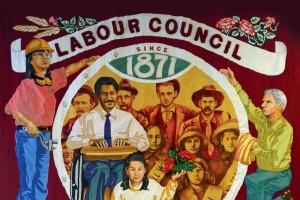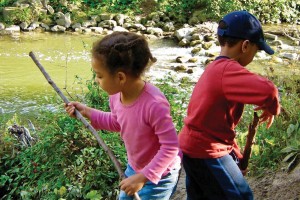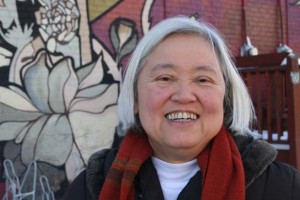It's a rainy evening in late February as men and women enter the British Columbia Federation of Labour building, set on Joyce Street among aging storefronts in a south Vancouver neighbourhood. Heading to a classroom, the group passes a series of framed images lining the hallway, including a photograph of a funeral procession in 1918. Union organizer Ginger Goodwin had been hunted down and shot, and the mourners, captured forever in black and white, would go on to organize a general strike. A poster glimpsed from an open office door has a more contemporary message: "Kill a worker, go to jail." It's the office of Gord Lechner, director of the federation's health and safety centre. Tonight, these people are attending, free of charge, one of the centre's unique offerings: an English as a Second Language course on health and safety.
The participants sit together at tables assembled in horseshoe formation and share information about a recent job fair. Lisa Rainbird, the instructor, appears just before 6 p.m. and starts handing out copies of a news article about a study on the lack of regular hand washing among staff in B.C. hospitals. Students are still arriving, filling 17 seats, as Rainbird reads the article aloud.
"I remember one doctor who wore the same gloves to do operations all day," responds Awat Hosseini, who was a surgery nurse in Iran. She has been in Canada for four months and has just been hired as a part-time home care worker. The ESL students learn that hygiene practices have improved in B.C. since the study came out, resulting in more hand washing among staff and the placement of hand sanitizers in hospital corridors.
THE LANGUAGE OF RIGHTS
Breaking into groups, students continue to discuss safety issues. "No one told me not to mix chemicals to clean toilets," says Gladys Liu, a housekeeper in a nursing home. She learned from Rainbird that her "toxic mix" at work could lead to cancer. Liu, originally from Taiwan, where she had a career in international trade, has worked in the nursing home for four years. "Why have I worked here so long?" she later wrote to Our Times, for the magazine's "Working for a Living" series of short stories. "First, my English is not good enough to return back to my original trade career in Taiwan. Second, the facility is just a couple of blocks away from my home, so I can bike or walk to work. The third reason is the wage is higher than the minimum wage and I have medical benefits, for my husband and kids, too." When asked what she liked best about her job, she said: "If I had more time at work, I would like to talk with the residents. They are so bored every day. I like to cheer them with singing, or just talk with them. That's the best part of my job."
Sophie Sun was a quality engineer in China and now works as a cashier in a restaurant and is a part-time student. She has lived in Canada for a year and is impressed with the health and safety standards. "Workplaces are posted with signs," she says, "and we have to wear gloves. People learn about carrying heavy things and lifting from the legs, not the back."
"Not having English is a barrier," says Tadd Zhu, also from China, who works in a casino. Along with his wife, Fiona, a homemaker, they appreciate the language skills they continue to gain in the course. "This course also helps us learn about the dangers at work, and the rights of working people." "It's a very practical course," agrees Ikuko Nishino, "because the health and safety issues can be used in many circumstances." Nishino washes dishes in a restaurant, having emigrated from Japan four months ago.
MEETING CRISIS WITH CONFIDENCE
Liu also says the course has made a difference, really helping with her housekeeping job. She recalls one evening, around 6 p.m., when she was working after the manager and supervisor had gone home. "I was hurt by a sharp shelf but, that time, I just thought I should keep working and finish my job. Later, I reported to the nurse and filled up the incident report paper with her help. If I had taken the course earlier, I would have known how to deal with it."
Rainbird says many of the participants she has taught over the last seven years work long hours and hold down up to three jobs. "For some, it's a break to come to class," she observes. The most important goal, she says, is to let students know they have rights as workers. "The course gives them confidence, because they often end up knowing more than their co-workers and supervisor."
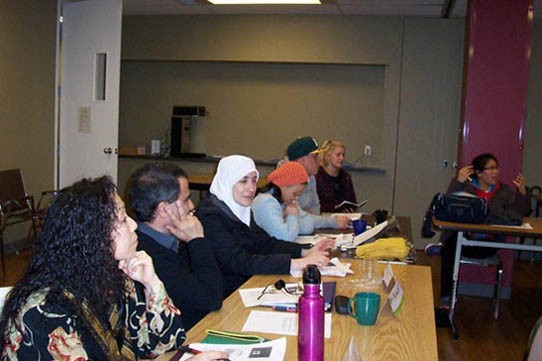
WorkSafe BC, an employer-funded insurance group formerly known as the Workers' Compensation Board, provides grant money to the federation to run the course, covering the instructor's salary. For its part, the federation provides the classroom space and hosts graduation dinners. The federation also advertises the course, although "word of mouth" accounts for at least half of the students who enrol.
Long before teaching these twice-weekly classes, Rainbird worked at Immigrant Services Society of BC, a non-profit organization that serves the settlement, training and integration needs of newcomers to Canada. She says she noticed a lack of effective ESL materials on work safety, "and there was a need to teach this because of injuries on the job." So, Rainbird enrolled in the occupational health and safety program at the British Columbia Institute of Technology (BCIT), and graduated two years later. There, she gained extensive knowledge about the major categories of workplace hazards, which include chemical, physical, biological, ergonomic and psycho-social hazards. Rainbird started her own consulting firm and, soon after, met Sheila Moir, who was then occupational health and safety director for the federation. Moir was also interested in developing programs to reach new Canadians, and the result was this 14-week course, designed and taught by Rainbird.
WORKERS HOLDING COMPANIES ACCOUNTABLE
Students have followed up by taking more work and safety courses at BCIT, Rainbird says. "Most important, they know they can telephone WorkSafe BC confidentially if there is an issue, and a staff member will come out and inspect their workplace." The inspector will write an order if he or she agrees there is a violation, and the company is legally required to take action or be subject to a fine.
"I have had students using gardening gloves to handle biohazards," Rainbird says. "They felt the gloves were more comfortable. They were not trained to use proper protective equipment until they took this course. I had another student told to change light bulbs without being allowed by her supervisor to turn the light switch off or follow any lockout procedure. Other participants have complained because their workplace refused to supply soap for the bathrooms. In all of these situations, I have shown participants how to find out what the regulation says. They then took this information to their safety committee or supervisor, usually with a positive result."
Bullying in the workplace is another hot topic. "We brainstorm ways to stop bullying. One student was bullied by her supervisor. By the end of this course, she had the confidence to tell the manager about it. The manager was horrified and didn't know this was going on. He sent a letter to the staff requesting that everyone be treated respectfully. She was very proud of this letter."
THE POWER TO CHANGE IT OR WALK AWAY
Sometimes, it's about getting out of an emotionally toxic workplace environment and looking for another job. Says Rainbird: "We practise answering difficult job interview questions, which seems to help, and many students are successful in finding new work. As well, by the end of the course, most students are able to write letters to their health and safety committees, making recommendations about issues in their workplace."
The program has several guest speakers, including a federation staff member, who talks to students about basic employment standards. "Some participants have become more active in their unions because of this course," Rainbird says. "Unions play a huge role with workers' rights, and health and safety is an extension of that." She hopes to eventually develop an online ESL health and safety curriculum in order to reach more people.
In Canada, on average 1,050 workers are killed every year because of their work and 150 of these people are from B.C. The provincial laws give workers some protection, such as compulsory health and safety orientation for young and new workers, and the right to refuse unsafe work.
SPREADING THE WORDS
The National Day of Mourning, held every April 28, recognizes people who have died, been injured, or suffer illness because of their work. This annual remembrance, with its powerful message, was initiated by Canadians 26 years ago and, since then, has spread around the world.
Gord Lechner says many barriers continue to prevent workers from gaining the information they need to be safe. "We can get to workers," he says of the federation's ESL course, "and they trust us." Besides reaching out to new Canadians, Lechner says seasonal workers, such as farm workers, are also offered courses where translators are provided. "Alive After Five," another key program, uses a peer training approach and real-life case studies to help young workers learn about their rights under the Workers Compensation Act and occupational health and safety regulations, and how to exercise those rights on the job.
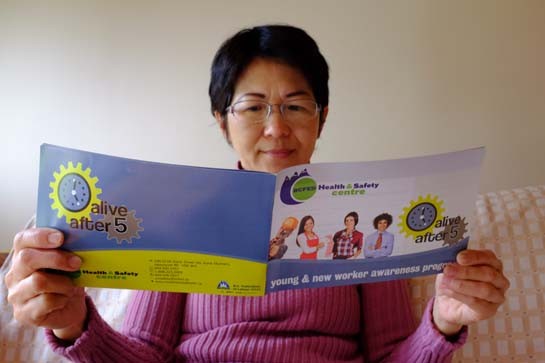
Lechner says he doesn't know any other Canadian province running this type of ESL course. "It takes a strong person to speak up in the workplace," he says. "When you don't feel confident about language, it's even more of a disadvantage."
BREAKING BARRIERS, MAKING BONDS
He notices friendships develop among participants. "It strikes me that these people, from vastly different backgrounds, learn and practise English together and form strong bonds," he says. "It's a microcosm of how things should be outside the classroom."
The labour federation is expanding this unique curriculum by partnering with Decoda Literacy Solutions to run similar courses in communities across the province. More barriers will be removed, Lechner says, because instructors will also reach out to workers lacking literacy skills or dealing with learning challenges -- as well as those who want to improve their English-language skills. "This program is going to help far more people," he says.
*************
Rainbird's final lesson of the night is on fire safety, "the third leading cause of death in the workplace," she tells the class. Students follow along with a handout that has lots of graphics. They learn the different ways fires start. Holding up a fire extinguisher, Rainbird explains what's inside the tube, how to operate it, and the need for annual maintenance. "Has anyone used a fire extinguisher?" she asks. Franco Kai Kwong Chan, a dietary aide in a hospital, puts up her hand and says she had training at a medical laboratory in Hong Kong.
Rainbird provides an easy way for students to operate the canister by telling them to remember the four letters in the word PASS: "P" is for "pull" the pin, "A" is for "aim" at the base of the fire, "S" is for "squeeze" the lever, and the second "S" is for make a "sweeping" motion as the foam is released.
"Imagine a fire has broken out," Rainbird says. "Am I in a good position now?" she asks, as she moves away from the door. "No," comes a chorus of replies. "That's right," Rainbird says. "You want to back in to the escape route, not become trapped.
"Should I test this out?" Rainbird asks, holding up the tank. Students call out "No." "That's right," she agrees, "because then the pressure will cause the foam to seep out and it will have to be re-serviced right away."
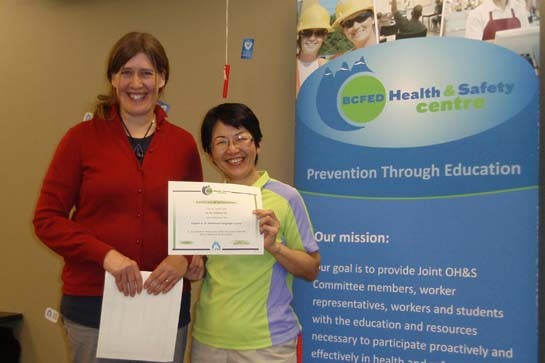
The last lesson of the evening is a cartoon hand-out, showing a man in a cluttered living room in a house. Students, working with a partner, are instructed to circle 14 fire hazards. After lots of talking, the class is brought back together by Rainbird, who helps students express their findings with phrases such as "The TV stand is unstable" and "the outlet is overloaded."
"Next class there will be a short quiz on fire safety," Rainbird announces with a smile. She works with students to find the best date to hold an in-class potluck dinner and then reminds them of their graduation date in April. The evening of very serious topics, some life-threatening, ends for participants with lots of friendly smiles and "good nights."
Janet Nicol is a Vancouver-based freelance writer and regular blogger.


